| 1 |
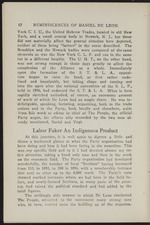 |
“...T. & L. A., opposi-
tion began to raise its head, at first rather unde-
fined and impalpable, but taking shape and coming out
into the open after the national convention of the S. L. P.,
held in 1896, had endorsed the S. T. & L. A. What is here
rapidly sketched embodied, of course, an enormous amount
of work of which De Leon had an ample share. He was in-
defatigable, speaking, lecturing, organizing, both in the trade
unions and in the Party, both locally and elsewhere, aside
from Lis work as editor in chief of The People, the official
Party Organ, his efforts ably seconded by the two men al-
ready mentioned, Sanial and Vogt.
Labor Faker An Indigenous Product
At this juncture, it is well again to digress a little and
throw a backward glance at what the Party organization had
been doing and how it had been faring in the meantime. This
was .ray specific field and to it I had devoted almost my en-
tire attention, taking a hand only now and then in the work
on the economic field. The Party ...”
|
|
| 2 |
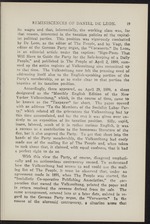 |
“...REMINISCENCES OF DANIEL DE LEON. 19
its wages and that, inferentially, the working class was, for
that reason, interested in the taxation policies of the capital-
ist political parties. This position was vigorously combatted
by De Leon, as the editor of The People, and by Vogt, the
editor of the German Party organ, the Vorwaerts. De Leon,
in an editorial article under the caption; Sign-Posts That
Will Have to Guide the Party for the Safe-keeping of a Daily
People, and published in The People of April 2, 1899, sum-
med up the entire register of Volkszeitung sins committed up
to that time. The Volkszeitung now felt the pressing need of
addressing itself also to the English-speaking portion of the
Party s membership, so as to make clear to that portion the
beauties of its taxation position.
Accordingly, there appeared, on April 29, 1899, a sheet
designated as the Monthly English Edition of the New
Yorker Volkszeitung, which, in the course of time, came to
be known as the Taxpayer for short...”
|
|
| 3 |
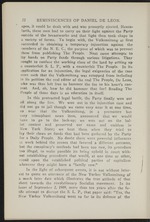 |
“...succeeded in obtaining a temporary injunction against the
members of the N. E. C., the purpose of which was to prevent
them from publishing The People. Next came attempts to
lay hands on Party funds through various litigations. They
sought to confuse the working class of the land by setting up
a counterfeit S. L. P., with a counterfeit The People. In its
application for an injunction, the legal exigencies of the case
were such that the Volkszeitung was estopped from including
in its petition the real editor of the real The People, De Leon,
who was thus left free to hammer the foe to his hearts con-
tent. And, oh, how he did hammer that foe I Reading The
People of those days is an education in itself.
In this protracted legal battle, the Party finally won out
all along the line. We won out in the injunction case and
did not go to jail though we came very near it at one time,
so near that the Volkszeitung, in a premature but
very triumphant news item, announced that we would
have to go to the lock-up;...”
|
|
| 4 |
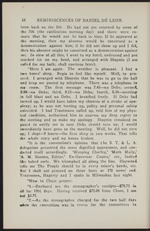 |
“...authorized him to express my deep regret to
the meeting and to make my apology. Shaynin remained on
guard to notify me in case Debs should turn up; I would
immediately have gone to the meeting. Well, he did not turn
up; I slept9 hoursthe first sleep in two weeks. That tells
the whole story and no bones broken.
It is the convention's opinion that t he S. T. & L. A.
delegation presented the most dignified appearance, and con-
ducted itself accordingly. Weeping Charley, Moth Maily,
A. M. Simons, Editor, Ex-Governor Coates, etc., looked
like baked owls. We triumphed all along the line. Haywood
tells me The People should be in every miners hands, etc.
But I- shall not proceed on these lines or Ill never end.
Trautmann, Hagerty and I spoke in Milwaukee last night.
"Now to Chase proper:
"1.^Enclosed are the stenographers receipts$78.75 in
all for 19)4 days. Having received $75.00 from Chase, I am
out $3.75.
2.As the stenographer charged for the two half days
when the convcatioa was in recess for...”
|
|
| 5 |
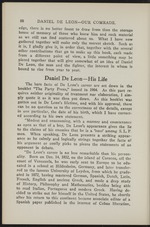 |
“...sent to Europe to be edu-
cated in a school at Hildesheim, Germany, and later transfer-
red to the famous University of Leyden, from which he gradu-
ated in 1872, having mastered German, Spanish, Dutch, Latin,
French, English and ancient Greek, and made a deep study
of History, Philosophy and Mathematics, besides being able
to read Italian, Portuguese and modern Greek. Having de-
cided to strike out for himself in the United States, he shortly
after his return to this continent became associate editor of a
Spanish paper published in the interest of Cuban liberation....”
|
|
| 6 |
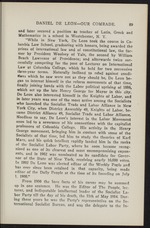 |
“....contact with some of the
Socialists of that time, led him to study the theories of Karl
Marx, and his quick intellect rapidly landed him in the rank
of the Socialist Labor Party, where he soon became recog-
nized as one of its clearest and most uncompromising expon-
ents, and in 1902 was nominated as its candidate for Gover-
'eceiving nearly 16,000 votes,
in 1894 De Leon was elected editor of the Weekly Pople and
has ever since been retained in that capacity, being made
l'*'l900^ at the time of its founding on July
From 1900 the bare facts of his career may be summed
up in one sentence. He was the Editor of The People, lec-
turer, and indisputable intellectual leader of the Socialist La-
bor Party till the day of his death, the 11th of May 1914. Dur-
ing these years he was the Partys representative on the In-
ternational Socialist Bureau, and was the delegate to the In-...”
|
|
| 7 |
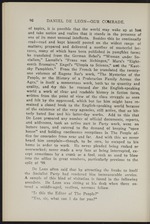 |
“...rushed or
overworked; never made a wry face at being interrupted, ex-
cept .sometimes by a crank or a fool, such as used to blow
into the office in great numbers, particularly previous to the
split of 99.
De Leon often said that by attracting the freaks to itself
the Socialist Party had rendered him immeasurable service.
A sample of this kind of visitation is found in the following
anecdote. De Leon was sitting at his desk when there en-
tered a middle-aged, restless, nervous fellow.
Is this the Editor of The People?
Yes, sir, what can I do for you?...”
|
|
| 8 |
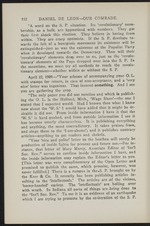 |
“...From inside information I have it that the
W. S. is hard (pushed, and from outside information I see it
has become utterly characterless. It is publishing everything
and anything, the most contradictory. It takes praises from,
and sings them to the I-am-abums; and it publishes contrary
articlesanything to get readers and shekels.
Your nice and polite letter to the heathen will surely be
productive of inside lights for present and future use.For in-
stance, that letter of Mary Marcy, Associate Editor of Int1
Soc. Rev., serves to confirm inside information I have, and
the inside information may explain the Editors letter to you.
[This letter was very complimentary of the Open Letter and
promised to publish the same, which promise, however, was
never fulfilled.] There is a rumipus in the.S. P.^ brought on by
the Kerr & Co. It recently has been publishing articles in-
sulting to the intellectuals. The articles are .of the vicious,
horny-handed variety. The intellectuals are boiling over
with...”
|
|
| 9 |
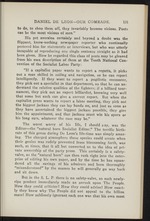 |
“...a billiard tour-
nament, they pick out an expert billiardist, knowing very well
that none but such can give a correct report. But when the
capitalist press wants to report a labor meeting, they pick out
the biggest jackass they can lay hands on, and just as soon as
they have ascertained the biggest jackass possible, they give
him the appointment, and that jackass must win his spurs or
his long ears, whatever the case may be.
The worst worry of his life, I should s ay, was the
Editor the natural born Socialist Editor.^* The terrific birth-
rate of this genus during De Leons life-time was simply amaz-
ing. The charged atmosphere these species could create when
their genius was rudely prevented from blossoming forth, was
such, at times, that it all but converted us to the idea of pri-
vate ownership of the party press. This certainly is a safety-
valve, as the natural born can then rush right into the enter-
prise of editing his own paper, and by the time he has squan-
dered all the savings...”
|
|
| 10 |
 |
“...the S. L. P. were very good, indeed, De
Leon should be given credit for having contributed to make
these clear, but he failed entirely when it came to making them
attractive to the massesin fact, as an editor, an organizer,
and a leader he was a back number, and if it was not for the
fact that he was a boss and an incurable egoist, he would rec-
ognize this and step aside and give place to number one!
How painful this subject really was to him may be seen
from the following story.
After one of the N. E. C. meetings, when we had gone
through an unusually hard siege of aspiring Es or A.E.s,
as we used to call them for short, my brother wrote De Leon
a formal application for the assistant editorship. As reference
of his ability, he stated the fact that for a whole year he had
been the editor in chief of the Swedish Bazar Nisse (a bazar
program, issued once a year, containing, besides the program,
some advertisements, a few jokes, and perhaps a foolish tale or
two). To demonstrate his literary...”
|
|
| 11 |
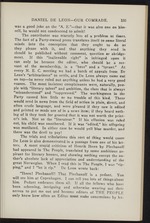 |
“...DANIEL DE LEONOUR COMRADE.
133
was a good joke on the A. E.that it was also one on him-
self, he would not condescend to admit!
The contributor was scarcely less of a problem at times.
The fact of a Party-owned press translates itself to some literal
minds into the conception that they ought to do as
they please with it, and that anything they send in
should be published without comment, question or abridge-
ment. If this inalienable right is infringed upon it
can only be because the editor, who should be a ser-
vant of the membership, is a "boss and a "tyrant. At
every N. E. C. meeting we had a batch of appeals from De
Leons "arbitrariness to settle, and De Leon always came out
on tophe never ruled out anything unless he had a very good
reason. The most insistent complainants were, naturally, peo-
ple with literary talent and ambition, the class that is always
"misunderstood and suppressed. The workingmen in the
Party caused him little or no trouble of this kind. These
would send in news...”
|
|
| 12 |
 |
“...WITH DE LEON SINCE '89. 5
earnest, that the time for experimenting with all sorts of
uTfi hat the Socialist Labor Party
should become a real political party, not only a party of prop-
aganda. Several Sections, under the leadership of W Rosen-
berg and F. Bushe, editor of the Workmen-'s Advocate, the of-
ficial p^ty organ^-the American Section of New York among
em 00k the stand that the time had arrived for the Social-
ists to enter the political arena not here and there and at in-
definite periods, but to unfurl the banner of International So-
cialism on American soil without compromise or fusion with
any other political party. It was here that the New Yorker
Volkszeitung did its nefarious work by using its influence to
drive both Rosenberg and Bushe out of the party, and all
those who stood with them as well.
Rosenberg and Bushe thought they had the whole party
organization to back them up, and without doubt the majority
S infliL r"* But what wa a little
tene o organization to the Volkszeitung...”
|
|
| 13 |
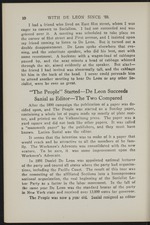 |
“...papers. It was called
a mammoth paper by the publishers, and they must have
known. Lucien Sanial was the editor.
It seems that the intention was to make of it a paper that
would reach and be attractive to all the members of he fam-
ily. The Workmens Advocate was consolidated with the new
venture. To be sure, it was some improvement upon the
Workmens Advocate.
In 1891 Daniel De Leon was appointed national lecturer
of the party and toured all states where the party had organiza-
tions, including the Pacific Coast. The result of this tour was
the cementing of the affiliated Sections into a homogeneous
national organization, the real beginning of the Socialist La-
bor Party as a factor in the labor movement. In the fall of
the same year De Leon was the standard bearer of the party
in New York state and received over 13,000 votes for governor.
The People was now a year old. Sanial resigned as editor...”
|
|
| 14 |
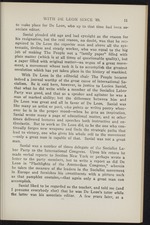 |
“...WITH DE LEON SINCE 89. U
to make place for De Leon, vvlho up to that time had been as-
sociate editor.
Sanial pleaded old age and bad eyesight as the reason for
his res^naition, but the real reason, no doubt, was that he rec-
ognized in De Leon the superior man and above all the sys-
tematic, tireless and steady worker, who was equal to the big
job of making The People not a family paper filled with
plate matter (which is at all times of questionable quality), but
a paper filled with original matteran organ of a great move-
ment. a movement whose task it is to accomplish the greatest
revolution which has yet taken place in the history of mankind.
With De Leon in the editorial chair The People became
indeed a journal worthy of the great cause of international So-
th t*; K to Lucien Sanial.
that what ihe did write while a member of the Socialist Labor
Party was good, and that as a speaker and agitator he was a
man of marked ability; but the difference between him and
De Leon was great and...”
|
|
| 15 |
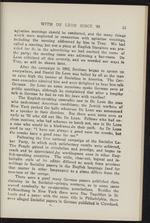 |
“...if^*
New York packed the halls wheneveT D^e Le'^'"'
as a speaker in their districts bT announced
early as 92 who did not like Dp T "<=
clean motives, who had schemes to hT'
a man who would be a hindranr ' Leon
used to say: "f have not Path. As De Leon
the crooks have a good nose Tol LT'
bor PartrTnTLcrLThTSfrcl^'*'''" ^a*
The People gained in circulation n !7 were achieved,
reach and be appreciated .by workingmen^*^*^^
lish-speaking countries. The virile clpn ber Eng-
imitable style of its editor diffp ^S'cal and in-
writings in Socialist papers in the E r Previous
that matter i other langua Ta
tom-tom of the savage. P'"o differs from the
claiming to be So^cTlltTp"TvaT*t P*'"bed then,
owned nominally by co-operativl some cases
Volkszeitung in New York there Besides the
Louis and a paper with the same fT in St.
were alleged Socialist papers in Ger ^ ^ Philadelphia; there
^ German published in Cleveland,...”
|
|
| 16 |
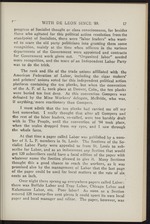 |
“...pleased to give it. Many Sections
thought this a good chance to reach the w^orkers, as it was
promised also by the management of Labor that the last page
of the paper could be used for local matters at the rate of six
cents an inch.
Over night there sprang ap everywhere papers called Labor;
there was Buffalo Labor and Troy Labor, Chicago Labor and
Kalamazoo Labor, etc. Poor labor! As soon as a Section
secured 120 twenty-five cent pieces It could sport its own local
paper and local manager and editor. The paper, however, was...”
|
|
| 17 |
 |
“...the paper from the town
where it was dated, so the paper had to be sent by express to
the city where it was to appear as a local paper.
We in Troy, too, had our Labor experience. An old Ger-
man comrade was elected editor and I was elected manager.
I managed to get the 120 subscribers, and the local editor
edited the inches on the last page, at six cents an inch. Some-
times we lhad ten inches of local editorial matter, sometimes
more, depending upon the funds. As local manager, I had fre-
quent consultations with the local editor relative to the num-
ber of inches we were to have that week. When I later related
to De Leon all the tribulations of a local manager and local
editor, and how on one occasion the local editorial had to be
omitted, because that week the local editor was too busy cut-
ting sauerkraut, De Leon laughed heartily and chuckled as only
those can picture who have seen and heard De Leon laugh
and chuckle,-not a loud, boisterous, or hysterical laugh, but
like the gurgling...”
|
|
| 18 |
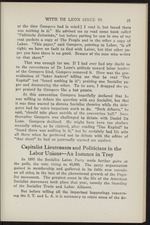 |
“...with any Socialist, but that
it was time wasted to discuss Socialist theories while the dele-
gates had far more important work to do. Such debates, he
said, should take place outside of the convention hall. Soon
thereafter Gompers was challenged to debate with Daniel De
Leon. Gompers declined. He might have been too shallow
mentally when, as he claimed, after reading Das Kapital he
found there was nothing in it, but he certainly had his wits
all there when he preferred not to debate with the editor of
that sheet he had so paternally warned me against.
Capitalist Lieutenants and Politicians in the
Labor Unions^An Instance in Troy
In 1895 the Socialist Labor Party made further gains at
the polls, the vote rising to 45,000. The party organization
gained in membership and gathered in its folds new recruits
on all sides, in the face of the phenomenal growth of the Popu-
list movement. The greatest event in the life of the American
Socialist movement took place that year, namely the founding...”
|
|
| 19 |
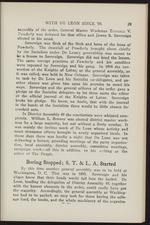 |
“...to mend his
ways. Sovereign and the general officers of the order gave a
pledge to the Socialist delegates to let them name the editor
of the official journal of the Knights of Labor. Sovereign
broke his pledge. He knew, no doubt, that with the journal
in the hands of the Socialists there would be little chance for
crooked acts.
In District Assembly 49 the reactionists were whipped com-
pletely. William L. Brower was elected district master work-
man by a large majority, but not without a lively combat. It
was mainly the tireless work of De Leon whose activity and
most strenuous efforts brought in newly organized locals. In
those days there was hardly a night that De Leon was not
deliyering a lecture, attending meetings of the party organiza-
tion, local assembly, district assembly, committee meetings
campaign work,all this in addition to his writing as th
editor of The People.
Boring Stopped; S. T. & L. A. Started
By this time another general assembly was to be held at
Washington, D. C....”
|
|
| 20 |
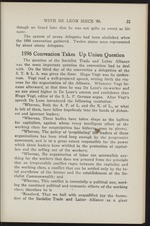 |
“...Question
The question of the Socialist Trade and Labor Alliance
was the most important que'stion the convention had to deal
with. On the third day of the convention a delegation of the
S. T. & L. A. was given the floor. Hugo Vogt was its spokes-
man. Vogt read a well-prepared speech, setting forth the rea-
sons for the organization of the Alliance. Whatever Vogt be-
came afterward, at that time he was De Leons co-worker and
no one stood higher in De Leons esteem and confidence than
Hugo Vogt, editor of the S. L. P. German organ. After Vogts
speech De Leon introduced the following resolution:
Whereas, Both the A. F. of L. and the K. of L., or what
is left of them, have fallen hopelessly into the hands of dishon-
est and ignorant leaders;
Whereas, These bodies have taken shape as the buffers
for capitalism, against whom every intelligent effort of the
working class for emancipation has hitherta^gone to pieces;
Whereas, The policy of propitiating* tlfineaders of these
Organizations has been...”
|
|
